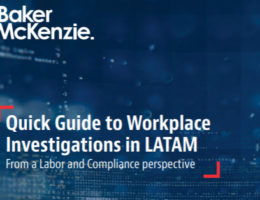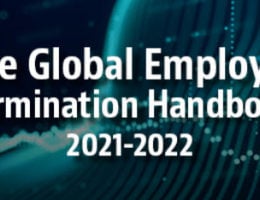Burnout in the workplace has become more widely recognized throughout the region. While workforce transformation is not a new concept for global organizations, the pandemic has forced us to rapidly adapt our standard ways of working and how we engage with employees, to ensure employee retention and the long-term viability of the business.
Per a study recently developed by Gallup, 43% of the world’s workers are experiencing daily stress and are, therefore, at risk of developing burnout. However, it was only recently that the World Health Organization included it as an occupational disease, which means that companies must be even more prepared to address and manage burnout cases properly. Lack of policies and protocols may aggravate risks for lack of proper employee support. Furthermore, many Latin American countries have undergone complex legal changes, which in many cases resulted in new regulations to protect employees in these situations.
With increased regulatory scrutiny and the emergence of employee activism, companies have experienced an elevated risk of trade secret disclosure from current or former employees acting as putative whistleblowers. In this episode, Aaron Goodman (Partner, Los Angeles) discussed key factors companies should consider in balancing their trade secret interests against the protections afforded to whistleblowers, with a focus on recent whistleblower laws across the globe.
In this report, we take a closer look at Latin America’s I&D landscape through the eyes of our local experts. While legal frameworks aimed at addressing inequality in the workplace have been slow to evolve, organizations in LATAM are getting ahead of lawmakers, implementing more evolved I&D strategies as they seek to respond to stakeholder and shareholder demand and to attract the next generation of workers
Provisional Measure 1,116 was published on 5 May 2022. The measure implemented the ‘Programa Emprega + Mulheres e Jovens,’ a program to include and maintain women and young people in the labor market. Also published was Decree 11,061, which provides for the right to professionalization of underage and young people through professional learning programs.
While the pandemic has disrupted business operations across the globe, Latin America is emerging as a promising destination and many companies are setting their sights on the region. More and more, companies are keen to understand what they need to know when expanding in Latin America from an employment perspective and how obligations and risk vary from jurisdiction to jurisdiction.
Mainly during the pandemic, the use of technological resources for performing a job has significantly grown. As a result, the access to such resources in the context of internal investigations has become almost a must. This triggers relevant concerns from a data privacy and a labor perspective.
As we step into another year and review the landscape ahead, we have rounded up our most recent updates and resources from across the globe to help employers prepare for 2022. The pandemic continues to shape workplace policies and practices, with an increasing move towards Mandatory Vaccination for workers, continued hybrid and remote working arrangements, ongoing changes to travel restrictions and more. Meanwhile, legal frameworks are evolving as governments step up their inclusion and diversity agendas, with Pay Transparency gaining traction in the US, a proposed Pay Transparency Directive on the horizon in Europe and the Work-Life Balance Directive due to be implemented this year.
Baker McKenzie’s Global Employment & Compensation Group presents the 2021-2022 edition of The Global Employer Termination Handbook.
On 10 November 2021, Decree 10,854 was published, addressing several infra-constitutional labor provision on various topics, such as food vouchers, registration before the Workers Feed Program, and transportation vouchers, as well as bringing new labor regulations, such as the Permanent Program for the Consolidation, Simplification and De bureaucratization of Infra-Legal Labor Regulations, and the Electronic Labor Inspection Book.
Bill of Law No. 2058/2021 (BL), initiated by the Chamber of Deputies on 06/07/2021, proposes amendments to the recent and controversial Law No. 14.151/2021, which deals with the removal of pregnant employees from on-site work during the public health emergency of national importance due to the new coronavirus. The BL specifically regulates (i) telework (ii) remote work and/or (iii) other forms of non-presential work, specifically with regard to pregnant employees.








